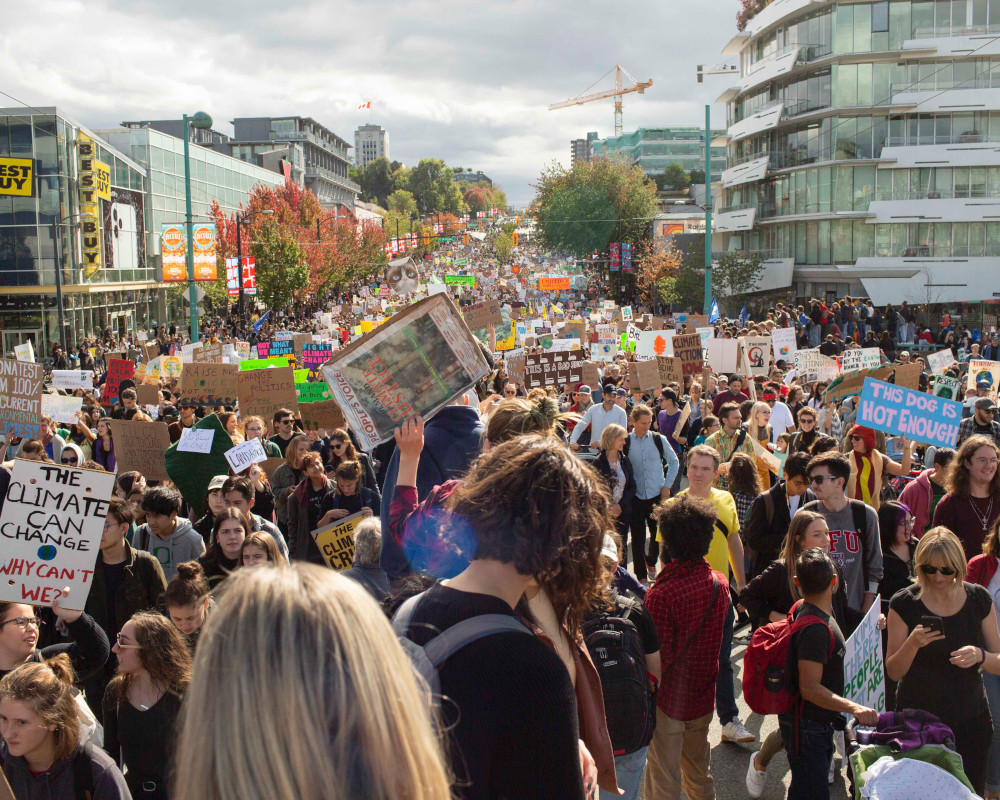[Editor’s note: This is an abridged version of a story that first appeared in our pop-up election newsletter, The Run. Sign up here to get new issues sent directly to your inbox every Tuesday and Thursday until election day.]
Every election, young people get to hear all the latest platitudes about the power of the youth vote.
It’s true that we’re the largest voting bloc in Canada. It’s also true that, as it stands, we have little faith in democracy. Youth don’t have much real experience with democracy in practice. As we navigate traditional family structures and our education system, we’re often taught to obey authority without question. Consequently, when we come of age, many of us aren’t used to having ownership over our lives and our communities.
As a recent high school graduate, an affordable housing activist and now a climate justice organizer, I’ve worked on several electoral campaigns, and engaged with politics in myriad ways.
My most empowering experiences have happened when I’ve worked with others to exercise our agency, build power and take collective action — days like the Sept. 27 climate strike and campaigns like the one aimed at passing Vancouver’s Climate Emergency Action Plan.
Electoral cycles, on the other hand, just make me angry.
It took nine tries for a bill lowering the voting age to 16 to pass second reading in the Senate, and it’s now in a lengthy consultation phase. This federal election, youth across the country are being denied on-campus voting. And across the board there are few candidates with a vision that comes close to meeting our overwhelming current reality, let alone actually offering us hope.
Take last week’s English-language leaders’ debate. We just experienced a season with a hellish heat dome, town-destroying wildfires, the fourth wave of a deadly pandemic, and an ongoing drug poisoning crisis. On the TV screen though, it felt like the party leaders were living in an entirely different world than us.
The way that “affordability” and “carbon tax” were tossed around as uninspired buzzwords made it feel like we were living inside a giant bubble of cognitive dissonance.
A particular low point came when Liberal Leader Justin Trudeau declared that “one of the enemies of progressive politics is cynicism.”
He’s not wrong. But he’s also a huge source of that cynicism.
The Liberal party has repeatedly claimed to be a climate leader, while jeopardizing our futures. When Trudeau is accountable to polluting oil and gas corporations instead of us, he shows us that we can’t trust anything he says. Young people see right through his formula. And thanks to him, we’re losing confidence in our democracy, too.
This isn’t just an election cycle problem. Young people’s cynicism about democratic processes is connected to a crisis of faith about the way we do politics and make change.
Younger millennials and generation Z were most commonly taught about change-making through individualized corporate activism, as seen in the WE “movement” (and its colossal failures). Rather than addressing the primary causes of global inequality, WE built a brand encouraging passionate young people to “save” children in other countries.
Narratives like WE’s advertise a market-based approach to solutions, and constrain our collective imagination in a way that only political parties do more effectively. Both use the guise of progressivism to distract us from real issues in our communities, and to stifle our understanding of what change is realistically achievable.
When youth are told to put our unfailing trust in the democratic process — and then it fails to deliver — it’s hard not to be increasingly skeptical of democracy, let alone our control over it.
Despite our cynicism, though, we’re not without hope. Young people know that we need to change how our society engages with democracy. “Get out the vote” campaigns and even voting itself hardly give anyone a real sense of agency. But learning how to organize will.
Researcher and seasoned organizer Jonathan Smucker describes organizing as the act of creating “a cohesive political force that can contest power.” Voting becomes the very last thing that you do. Your focus is on exposing root causes, politicizing the everyday spaces that you’re a part of and pressuring your leaders to keep their promises.
Smucker also reminds us that knowing what is wrong with society is very different from understanding how to change it. But it’s exactly that understanding which can counter hyper-individualized, neoliberal “activism” and restore our trust in collective action.
When we engage in a conversation about how someone else’s life will be materially improved by a broader solution, and when we come together with thousands of others, we take back control of democracy. When we volunteer for champions who see the value of people power and political power, we’re ensuring that the fate of our communities is in our own hands.
In doing so, we can build movements that popularize real solutions and push our leaders to actualize them, instead of professing false hope that a group of out-of-touch candidates will deliver.
The COVID-19 pandemic has decimated lives, and recent climate impacts have given us a taste of future chaos. This federal election is taking place at a particularly decisive moment.
Yet we also know that we can transition our energy system and create communities where we all have what we need to thrive.
If everyone, including young people, envisions the task ahead of us as a collective project, we can reimagine what is possible for society. If we build the power to actually make it happen, we can reframe what we deserve from our government. Only then will we be able to reclaim our faith in democracy.
THE RUNDOWN
Additional readings reeled in from around the web.Champions do exist: You can organize to help get them elected. 350 Canada has endorsed several incumbents who’ve shown that they have the courage to meet the moment we’re in head on. 350.org is also supporting a host of first-time candidates who would be unmatched in Parliament.
The experts can be off-base too: Be wary of the methods and motivations behind policy analysis. Trust your instincts first and foremost — if the Liberals bought a pipeline the day after declaring a national climate emergency, how has their track record improved so much? (Of course, it hasn’t.)
Everything is connected: Young people have grown up with a lived reality of many crises. We know that solutions are strongest when they tackle multiple issues and are designed by the people most affected. Yet not only are youth pandered to only when it’s convenient, the issues that matter most to us have been conspicuously absent from this election’s discourse. How are the young people in your life affected? Vote, and volunteer, with care for others. ![]()
Read more: Rights + Justice, Federal Politics, Election 2021, The Run

















Tyee Commenting Guidelines
Comments that violate guidelines risk being deleted, and violations may result in a temporary or permanent user ban. Maintain the spirit of good conversation to stay in the discussion.
*Please note The Tyee is not a forum for spreading misinformation about COVID-19, denying its existence or minimizing its risk to public health.
Do:
Do not: